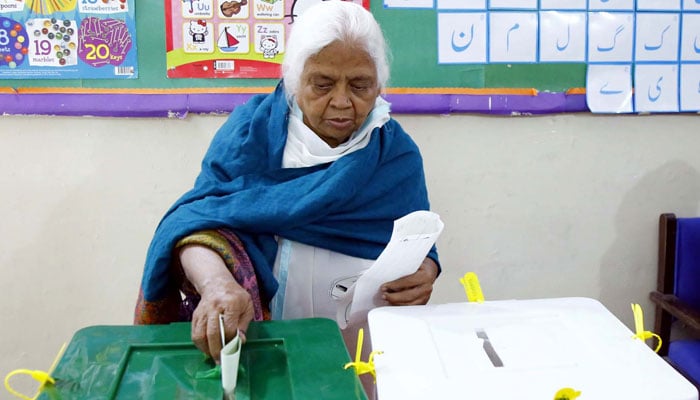Elderly people exercise right to vote despite all constraints
There was a long crater on a service road outside the HS Schooling System in District Central’s NA-247 constituency, along with numerous large and small ditches. Vehicles were lined up as they were unable to pass through the crater and ditches.
Voters had to exit their cars and navigate through the damaged road to reach the school which served as a polling station on Thursday.
“I came all the way from Malir to cast my vote because the election commission has not yet registered me as a voter in the Malir district,” said elderly voter Shaheena Mushtaq, tightly holding her son’s hand. She found it painful to reach the polling station where she had to use stairs to enter the booth and cast her vote.
Upon arrival, she took a break and gasped for air. A security guard brought her a chair, and she sat for a good 10 minutes. The polling station, designated for women only, had a long line. The polling staff kindly allowed her to cast her vote without waiting in the queue. “I have arthritis and cannot navigate these roads or climb stairs easily,” she said, emphasising that she ventured out of her home solely for the national cause of voting.
There’s an entire chapter in the Election Act 2017 dedicated to facilitating the voting process for differently-abled individuals. Pakistan has also inked its commitment to inclusion by signing the Article 29 of the United Nations Convention on the Rights of Persons with Disabilities spotlighting the participation of disabled individuals in political activities.
The Pakistani government has made amendments to the legal framework for the electoral rights of differently-abled individuals through the Elections Act 2017 and Electoral Rules 2017, aligning with the convention’s spirit.
The Section 74 of the Chapter 5 of the Election Rules 2017 titled ‘Manner of marking ballot paper if voter is incapacitated’ delves into exactly this.
If a voter is completely blind or in any other condition physically requiring assistance, the presiding officer may permit them to be accompanied by a companion who is not
less than 18 years old. “If the disability is such that the voter cannot mark the ballot paper themselves, the person accompanying the voter can mark the paper on the voter’s chosen candidate provided that the accompanying person is not the candidate or the candidate’s agent.”
If the companion has marked the ballot paper, the presiding officer shall clearly inform them that they have marked the ballot paper on the voter’s chosen candidate, and it is mandatory for them to maintain the secrecy of the vote and not disclose information about the elected candidate to anyone else. The presiding officer will prepare a list of such voters whose ballot papers have been marked by their companions.
In case a disabled voter has no finger at all to receive a personal mark of indelible ink the personal mark shall be applied on the backside of lobe of his right ear. Neither the law nor election rules make any mention of mandatory portable ramps for physically challenged voters, making it difficult for them to enter polling stations.
A majority of the polling stations on Thursday were located inside schools where the only entry was through stairs. In such situations, there were instances where physically challenged voters were brought into the polling stations by being lifted onto someone’s lap or arms.
A female voter at Karachi’s PECHS Block 2 polling station, who was in a wheelchair, was unable to cast her vote because her polling booth was located on the first floor on Thursday. After the presiding officer refused to allow her to cast her vote downstairs, bystanders lifted her wheelchair to the first floor.
-
 Jennifer Aniston Already Decided Her Wedding Dress?
Jennifer Aniston Already Decided Her Wedding Dress? -
 Prince Harry, Meghan’s Hollywood Party Drama Exposes Chaotic PR Strategy
Prince Harry, Meghan’s Hollywood Party Drama Exposes Chaotic PR Strategy -
 Jennifer Garner Reacts To Savannah Guthrie's Video As Search For Nancy Guthrie Continues
Jennifer Garner Reacts To Savannah Guthrie's Video As Search For Nancy Guthrie Continues -
 Bad Bunny Leaves Fans Worried With Major Move After Super Bowl Halftime Show
Bad Bunny Leaves Fans Worried With Major Move After Super Bowl Halftime Show -
 Captain Jason Talks Personal Hardships He Faced Ahead Of 'Below Deck' Season 4
Captain Jason Talks Personal Hardships He Faced Ahead Of 'Below Deck' Season 4 -
 Anti-monarchy Group Reacts To Prince William, Kate Middleton Statement On Epstein Scandal
Anti-monarchy Group Reacts To Prince William, Kate Middleton Statement On Epstein Scandal -
 Andrew 'must' Apologize Not Wider Royal Family For Jeffrey Epstein Links
Andrew 'must' Apologize Not Wider Royal Family For Jeffrey Epstein Links -
 Super Bowl 2026: Why Didn't Epstein Survivors Ad Air On TV?
Super Bowl 2026: Why Didn't Epstein Survivors Ad Air On TV? -
 'Harry Potter' TV Series Exec Teases 'biggest Event In Streaming': Deets
'Harry Potter' TV Series Exec Teases 'biggest Event In Streaming': Deets -
 Camila Mendes Finally Reveals Wedding Plans With Fiancé Rudy Mancuso
Camila Mendes Finally Reveals Wedding Plans With Fiancé Rudy Mancuso -
 Beatrice, Eugenie Blindsided By Extent Of Sarah Ferguson’s Epstein Links
Beatrice, Eugenie Blindsided By Extent Of Sarah Ferguson’s Epstein Links -
 Girl And Grandfather Attacked In Knife Assault Outside Los Angeles Home
Girl And Grandfather Attacked In Knife Assault Outside Los Angeles Home -
 Super Bowl Halftime Show 2026: What Did Trump Say About Bad Bunny?
Super Bowl Halftime Show 2026: What Did Trump Say About Bad Bunny? -
 Piers Morgan Defends Bad Bunny's Super Bowl Performance, Disagrees With Trump Remarks
Piers Morgan Defends Bad Bunny's Super Bowl Performance, Disagrees With Trump Remarks -
 Andrew Lands In New Trouble Days After Royal Lodge Eviction
Andrew Lands In New Trouble Days After Royal Lodge Eviction -
 Instagram, YouTube Addiction Case Trial Kicks Off In California
Instagram, YouTube Addiction Case Trial Kicks Off In California




